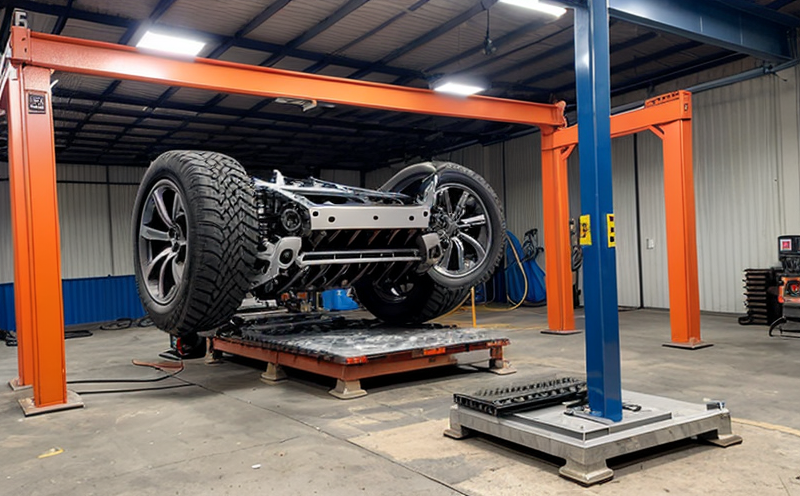Mechanical Durability Testing
The Key to Long-Term Reliability Mechanical Durability Testing
In todays fast-paced business landscape, companies are constantly seeking innovative solutions to optimize product performance and minimize downtime. One crucial service that plays a vital role in ensuring the long-term reliability of products is Mechanical Durability Testing. Conducted by leading laboratory experts at Eurolab, this comprehensive testing procedure evaluates a material or components ability to withstand various environmental conditions, stresses, and strains.
What is Mechanical Durability Testing?
Mechanical durability testing is an intricate process designed to assess the endurance of materials under mechanical loads, such as torsion, compression, tension, fatigue, and vibration. This laboratory service simulates real-world scenarios, subjecting samples to extreme temperatures, humidity levels, and other environmental factors that may affect their performance over time.
Why is Mechanical Durability Testing Essential for Businesses?
As manufacturers strive to produce high-quality products with extended lifespans, mechanical durability testing becomes an indispensable tool in the development process. By conducting thorough assessments of material properties and behavior under various conditions, companies can
Improve Product Reliability Identify potential weaknesses and design flaws, ensuring that products meet industry standards for performance and lifespan.
Reduce Costs Minimize the risk of costly failures, recalls, or repairs by identifying areas of improvement during the development phase.
Enhance Safety Ensure that materials used in safety-critical applications can withstand extreme conditions without compromising their integrity.
Meet Industry Regulations Comply with stringent regulations and standards, such as those outlined by regulatory bodies like ISO, ASTM, and IEC.
Key Benefits of Mechanical Durability Testing
Eurolabs mechanical durability testing service offers numerous benefits to businesses, including
Comprehensive Testing Methods Our laboratory employs a range of standardized and custom-designed testing methods, ensuring that your products meet the specific requirements of your industry.
State-of-the-Art Equipment We utilize cutting-edge equipment and technology to simulate real-world conditions with unprecedented accuracy and precision.
Expert Analysis Our team of experienced technicians and engineers provide detailed reports, offering actionable insights to optimize product design and performance.
Rapid Turnaround Times Eurolabs streamlined testing process ensures that results are delivered quickly, allowing businesses to make informed decisions and stay ahead of the competition.
QA Frequently Asked Questions about Mechanical Durability Testing
Q What types of materials can be tested for mechanical durability?
A Our laboratory assesses a wide range of materials, including metals, plastics, composites, ceramics, and other industrial materials.
Q What are the most common applications for mechanical durability testing?
A This service is crucial in industries such as aerospace, automotive, medical devices, consumer electronics, and construction, where product reliability and safety are paramount.
Q How do I prepare my samples for testing?
A Please follow our guidelines for sample preparation, which include instructions on cleaning, packaging, and labeling.
Q What kind of report can I expect after completing the mechanical durability test?
A Our comprehensive reports provide detailed results, including graphs, charts, and tables that summarize key findings. These reports are tailored to meet your specific needs and industry standards.
Conclusion
In todays highly competitive business environment, companies must prioritize product reliability and performance to stay ahead of the curve. Mechanical durability testing is an essential tool in achieving these goals. By leveraging Eurolabs expertise and state-of-the-art facilities, businesses can ensure that their products meet the highest standards for safety, efficiency, and lifespan.
At Eurolab, we understand the importance of accurate and reliable results in product development. Our dedicated team is committed to providing exceptional service, ensuring that your testing needs are met with professionalism and precision. Trust us to help you optimize your products performance and minimize downtime contact us today to learn more about our Mechanical Durability Testing services.
Learn More About Eurolabs Mechanical Durability Testing Services
Visit our website to explore the full range of laboratory services offered by Eurolab, including mechanical durability testing. Stay informed about industry news, best practices, and advancements in materials science through our blog and knowledge center.
-
Testing the physical durability of meters and measurement devices under mechanical stress
-
Verifying the robustness of devices when subjected to bumps, drops, and impacts
-
Assessing the device's ability to function correctly after being exposed to rough handling
-
Testing for physical damage, such as cracks or breakage, in the outer casing and display
-
Evaluating the resilience of moving parts and mechanical components in meters
-
Ensuring that the device maintains functionality under high-stress conditions
-
Assessing the long-term wear and tear of the device from repeated use
-
Testing devices designed for harsh industrial environments for shock resistance and durability
-
Verifying that the meter's housing can protect the internal components from damage
-
Testing for water ingress, dust, and foreign objects in the device casing
-
Verifying that buttons, knobs, or switches remain functional after extended mechanical stress
-
Evaluating the reliability of the device's connectors, cables, and ports over time
-
Assessing the durability of the display screen under mechanical forces like pressure or scratching
-
Ensuring that the device can withstand mechanical vibrations and rough transportation
-
Testing for degradation of the device casing due to exposure to chemicals or solvents
-
Evaluating the device's performance in real-world conditions, including physical shocks
-
Ensuring the mechanical design of the meter can withstand user errors or accidental misuse
-
Testing for reliability when the device is subjected to thermal cycling and rapid temperature changes
-
Verifying the robustness of connectors and cables used in industrial applications
-
Assessing how well the meter withstands high-impact environments like construction sites
-
Ensuring the device can function without major damage when dropped or exposed to heavy impact
-
Evaluating the impact on the meter’s accuracy when subjected to significant physical stress




